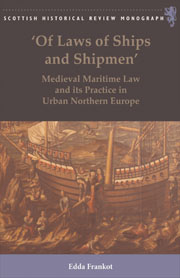Book contents
- Frontmatter
- Contents
- Tables and Maps
- Abbreviations
- Acknowledgements
- Preface
- Introduction
- 1 A History of Maritime Law in Northern Europe
- 2 Shipwreck, Jettison and Ship Collision in Maritime Law
- 3 The Five Towns Introduced
- 4 Written Law: Urban Collections of Sea Law
- 5 Written Law: Local Developments in Lawmaking
- 6 Legal Practice: the Administration of Maritime Justice
- 7 Legal Practice: Maritime Proceedings at the Urban Courts
- Final Conclusions
- Bibliography
- Index
2 - Shipwreck, Jettison and Ship Collision in Maritime Law
Published online by Cambridge University Press: 05 August 2013
- Frontmatter
- Contents
- Tables and Maps
- Abbreviations
- Acknowledgements
- Preface
- Introduction
- 1 A History of Maritime Law in Northern Europe
- 2 Shipwreck, Jettison and Ship Collision in Maritime Law
- 3 The Five Towns Introduced
- 4 Written Law: Urban Collections of Sea Law
- 5 Written Law: Local Developments in Lawmaking
- 6 Legal Practice: the Administration of Maritime Justice
- 7 Legal Practice: Maritime Proceedings at the Urban Courts
- Final Conclusions
- Bibliography
- Index
Summary
Of all things, in sea-shipping there are certain inevitabilities present in nature and imposed by circumstances, which lead to the formation of identical rules as regards content, regardless of geographical location or the state of legal culture at a particular time.
This quote, part of Landwehr's argument that it cannot be assumed that Roman law was adopted in Hamburg solely on the basis of a similarity in the regulation of jettison, must be kept in mind when comparing the content of the written laws which were introduced in the previous chapter. Too often the influence of one law on another is assumed simply because they regulate matters in a similar fashion. There are, however, certain preconditions in every situation regulated by law, and only a limited number of solutions that law can offer. It is only logical, then, that different law compilations should sometimes come to similar solutions for a particular legal problem.
The question that will be answered in this chapter is whether the written law compilations available in northern Europe did indeed come to similar solutions as regards the regulation of shipwreck, jettison and ship collision, and thus whether there was communality in this respect, even if direct influences cannot be established. To answer this question, the regulations of all the written sea laws available in northern Europe concerning each of these subjects will be compared.
- Type
- Chapter
- Information
- Of Laws of Ships and ShipmenMedieval Maritime Law and its Practice in Urban Northern Europe, pp. 27 - 52Publisher: Edinburgh University PressPrint publication year: 2012



